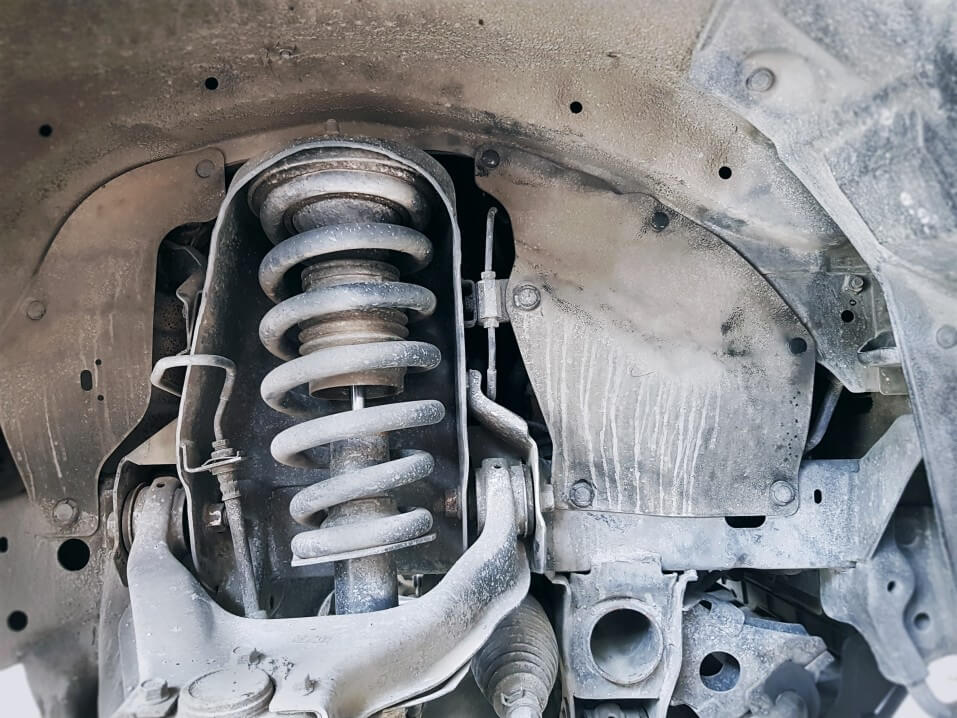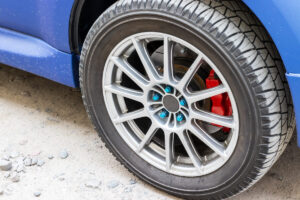Have you ever jumped in your car for a drive and felt something was a little off? Noises and vibrations in your vehicle are always concerning and can make you feel a little uneasy about driving your car.
It’s always best to get your vehicle checked by a mechanic when you hear unnerving noises and bumps. One common issue is shocks and/or struts needing to be replaced. Shocks and struts are designed to provide you with a smooth ride. Read on below to find out the signs to watch out for when your shocks or struts are bad.

Signs Your Shocks or Struts Need to be Replaced
If your vehicle isn’t driving smoothly and you notice any of these issues, there is undoubtedly a problem. Poor steering, quivering, vibrating, clunking, bumping, noises, tremors, the list goes on. But what are the specific symptoms that your shocks or struts need to be replaced?
1. Steering Issues
One common and noticeable sign that your shocks or struts are damaged is problems with your steering. Many will think it’s a power steering fluid issue, but you can rule that out with a quick check under the hood. Unusual or noteworthy noises while turning the steering wheel are a sure sign that something is wrong with your vehicle. A stiff or slow steering response is another signal that something is not quite right. You may find it challenging to turn the wheel or even to change lanes.
2. Leaking Fluid From Your Shock
If your shock starts leaking, you probably won’t notice at first, but your mechanic will. When you bring your vehicle to your mechanic, let them know you suspect an issue with your shocks or struts, they will check your car and diagnose the problem.
Leaking coming from behind the wheel is a clear sign that your shock is ready for replacement. It’s simple to check if the shock is leaking by taking the wheel off and checking for oil or grime build-up. There will be a warning on your shock that states you should not open it. So don’t try to open it!
3. The Front Of Your Car Dives During Hard Braking
A more noticeable indicator that you have worn out or bad shocks is if the front of your car tilts downwards when you use your brakes. Bad shocks will send the nose of your car down when you slam on the brakes.
4. The Rear Of Your Car Squats During Acceleration
You may notice a dramatic dive in the rear of your car and a rise in the front of your car when you accelerate hard if your shocks and struts aren’t working correctly.
5. Uneven Tire Wear
Check your tires for unusual wear. This is another indication that your shocks could be bad. It may look like small waves on the tire surface. If you notice this, you’ll want to get your shocks checked and changed asap as this is a sign that they require replacing and are worse than you might have thought initially.
6. Bouncing Tires
You may notice that when you hit a pothole, your tires bounce. Get those shocks changed as a matter of urgency as you do not have complete control of your car if the shocks are this bad. Bouncing tires makes the vehicle very unstable, and if you hit a pothole when you’re not expecting it, you risk more damage to your car and are at a higher risk of an accident.

7. Mileage Check
The older your vehicle is, the more replacements it may need. Over time, objects become worn and corroded. This is normal for any car, not just one with bad struts or shocks. But mechanics advise having your suspension, shocks, and struts checked for any necessary replacements around the 50,000-mile mark.
8. Your Vehicle Tips Or Leans More To One Side When You Turn
Is your vehicle leaning or tipping more than normal when you turn corners or change lanes? This could be a problem with your tires, so we suggest checking the tire pressure first to rule that out. If the problem persists, it’s time to check in with your mechanic for a strut and shock examination.
You may also notice, along with the leaning and tipping, that your car sways when changing lanes, and it’s difficult to steer away from the sway. This is dangerous as you don’t want to sway too far into the wrong lane and cause an accident. Keep this in mind when getting your struts checked and notify your mechanic.
9. High-Speed Instability
Not only will your vehicle be unstable when driving over potholes and while turning, but you may also recognize that your car seems to move up and down at higher speeds. Driving on the highway should be a smooth and easy ride. As you gain speed and accelerate, you may notice these symptoms if there’s an issue with the shocks and struts. If this happens to you, take the back roads and schedule service with your mechanic.
10. Damages To Other Parts Of Your Vehicle
You may be finding damage on the underside of the front bumper of your car, just for one example. If you are 100% sure you haven’t driven the front of your car over anything, it may be the suspension in your car is wearing out, and this is a common issue first caused by bad shocks or struts.
You may also have a broken coil spring. The springs work with your struts and shocks, so if there’s an issue with one, there could be an issue with the other. Worn-out shocks/struts put more stress on the springs, which can wear out the springs early.
What Can Happen If There’s A Major Issue With My Shocks Or Struts?
Shocks and struts keep your vehicle’s suspension securely balanced and keep your tires stabilized on the road. When one or both are deficient, your car can cause more than just an unpleasant drive.
Because of the additional pressure on other vehicle components, more damage and accidents are prone to happen. These additional damages can become quite costly too.
When Should I Take My Car For A Service If I Notice Any Of These Issues?
These issues happen gradually over time. This means they’re hard to pick up on unless there’s a significant problem. Because they happen progressively, it’s best to get your vehicle serviced and have your struts and shocks checked out at least every 50,000 miles.
Save your car any further damage and possibly save yourself from any possible accidents caused by worn-out or damaged shocks and struts. If you are in the Little Rock, Arkansas area, give us a call! 501-214-1091



